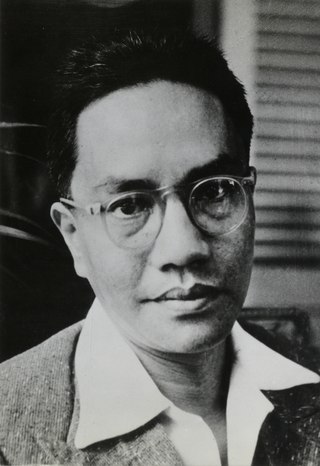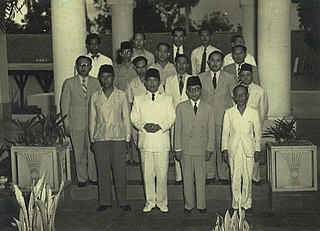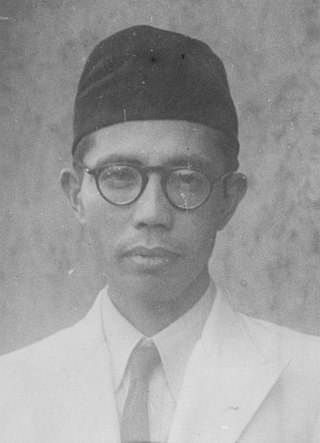
Amir Sjarifuddin Harahap was an Indonesian politician and journalist who served as the second prime minister of Indonesia from 1947 until 1948. A major leader of the left wing during the Indonesian National Revolution, he previously served as Minister of Information from 1945 until 1946 and Minister of Defense from 1945 until 1948. Amir was born into the Sumatran aristocracy and was educated at Leiden University. At Leiden, he became a member of the board of the Gymnasium student association in Haarlem and was involved in the Batak student organization Jong Batak. He returned to Indonesia due to family troubles but continued his education at the Rechts Hogeschool in Batavia.

The Roem–Van Roijen Agreement was an agreement made between Indonesian republicans and the Netherlands on 7 May 1949 at the Des Indes Hotel. The name was derived between the two principal negotiators at the meeting; Mohammad Roem and Jan Herman van Roijen. The purpose of the meeting was to iron out outstanding issues prior to Indonesian independence which was to be granted at the Round Table Conference at The Hague later that same year.

Liliyana Natsir is an Indonesian former badminton player who specialized in doubles. She is one of the standout front court player, with dexterousness and skill in controlling and executing the shuttlecock. Natsir has tremendous record over more than two decade by winning a gold and a silver from the Olympic Games, and four gold medals at the BWF World Championships. Her achievements are recognized worldwide, and was inducted in the BWF Hall of Fame in 2022.

Mohammad Natsir was an Islamic scholar and politician. He was Indonesia's fifth prime minister.

The Council of Indonesian Muslim Associations Party, better known as the Masyumi Party, was a major Islamic political party in Indonesia during the Liberal Democracy Era in Indonesia. It was banned in 1960 by President Sukarno for supporting the PRRI rebellion.

The Liberal Democracy period in Indonesia, also known as the Era of Parliamentary Democracy, was a period in Indonesian political history, when the country was under a liberal democratic system. During this period, Indonesia held its first and only free and fair legislative election until 1999, but also saw continual political instability. The period began on 17 August 1950 following the dissolution of the federal United States of Indonesia, less than a year after its formation, and ended with the imposition of martial law and President Sukarno's decree, which resulted in the introduction of the Guided Democracy period on 5 July 1959.

Assaat Datuk Mudo, known as Mr. Assaat, was born in Banuhampu, Agam, West Sumatra, Dutch East Indies. He was the only President of the Yogyakarta-based Republic of Indonesia before it became the part of the United States of Indonesia, and was in office from December 1949 until August 1950. He and a number of Indonesia founders, fought for the independence of Indonesia from the Dutch.

Burhanuddin Harahap was an Indonesian politician and lawyer who served as prime minister of Indonesia from August 1955 until March 1956. He was a member of the Masyumi Party and served as Minister of Defense concurrently with his tenure as prime minister. Afterward, he took part in the unsuccessful Revolutionary Government of the Republic of Indonesia (PRRI) rebellion in West Sumatra.

Sjafruddin Prawiranegara was an Indonesian statesman and economist. He served in various roles during his career, including as head of government in the Emergency Government of the Republic of Indonesia, as Minister of Finance in several cabinets, and as the first Governor of Bank Indonesia. Sjafruddin later became the prime minister of the Revolutionary Government of the Republic of Indonesia, a shadow government set up in opposition to the country's central government.

Tjoet Nja' Dhien is a 1988 Indonesian film directed by Eros Djarot and starring Piet Burnama, Christine Hakim, Rudy Wowor, and Slamet Rahardjo. Based on the life's story of female Acehnese guerrilla leader Cut Nyak Dhien, it focuses on the six-year period between her second husband, Teuku Umar's death and her capture by the Dutch colonial army. Tjoet Nja' Dhien was released to critical acclaim, winning 9 Citra Awards, and was screened at the Selection de la Semaine de la Critique in Cannes, 1989. It also became Indonesia's submission to the 62nd Academy Awards for the Academy Award for Best Foreign Language Film, but was not nominated.

The Third Sjahrir Cabinet was the fourth Indonesian cabinet. It served from October 1946 to July 1947, when it fell due to disagreements related to the implementation of the Linggadjati Agreement and subsequent negotiations with the Dutch.

The First Hatta Cabinet was Indonesia's seventh cabinet. It was formed by Vice President Mohammad Hatta, who was instructed to do so by President Sukarno on 23 January 1948, the same day the previous cabinet was declared dissolved. Following the second Dutch military aggression, when the republican capital of Yogyakarta was seized and most of the cabinet arrested, much of the cabinet was captured and sent into exile, although it was not formally disbanded. After the political leadership returned effective 13 July 1949 the cabinet continued its mandate until it was reshuffled on 4 August.

Soekiman Wirjosandjojo was an Indonesian politician and physician who served as prime minister of Indonesia from 1951 until 1952. Additionally, Soekiman served as the first president of the Masyumi Party from 1945 to 1951.

The Natsir Cabinet was the first cabinet formed after the dissolution of the United Republic of Indonesia and returned to the Unitary State of the Republic of Indonesia. This cabinet was in charge from 6 September 1950 until 20 March 1951.

The Soekiman Cabinet, also known as the Sukiman-Suwirjo Cabinet, was an Indonesian cabinet that served from 27 April 1951 until it fell on 23 February 1952 following revelations that it had signed a mutual security agreement with the United States, and was dissolved on 3 April 1952.
The 3 July Affair in 1946 was a political upheaval in the then newly formed Republic of Indonesia. The Prime Minister, Sutan Sjahrir, was kidnapped by factions within the military opposing the Republic’s negotiations with the Dutch during the Indonesian National Revolution. It ended with the release of Sjahrir and a re-structure of both the Republican government and the army.

The Ministry of Religious Affairs is an Indonesian ministry that administers religious affairs. It is responsible to the president, and is led by a minister.
In the context of Muslim society in Indonesia, Modernism or modernist Islam refers to a religious movement which puts emphasis on teachings purely derived from the Islamic religious scriptures, the Qur'an and Hadith. Modernism is often contrasted with traditionalism, which upholds ulama-based and syncretic vernacular traditions. Modernism is inspired by reformism during the late-19th to early 20th century based in the Middle East, such as the Islamic modernist, Salafiyya and Wahhabi movements. Throughout the history of contemporary Muslim Indonesia, these movements have inspired various religious organizations; from the mass organization Muhammadiyah (1912), political party Masyumi Party (1943), to missionary organization Indonesian Islamic Dawah Council (1967).

Melanchton Siregar was the co-founder and last chairman of the Indonesian Christian Party, and the commander of the Arrow Division, the military wing of the North Sumatra branch of the Indonesian Christian Party. He was also the member of the Central Indonesian National Committee since 1947.

Jusuf Wibisono was an Indonesian politician and economist. A member of the Masyumi Party, he served as Minister of Finance from 1951 until 1952 and again from 1956 until 1957, under the Soekiman and Second Ali Sastroamidjojo cabinets. Originating from Magelang, Wibisono took part in Islamic organizations in the nationalist movement from his school years. He joined Masyumi during the Indonesian National Revolution, and became a leading member within the party despite disagreements with other party leaders such as Mohammad Natsir. In both of his tenures as finance minister, he relaxed the tight budgetary controls of his predecessor, and provided favors to political parties.

















